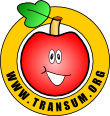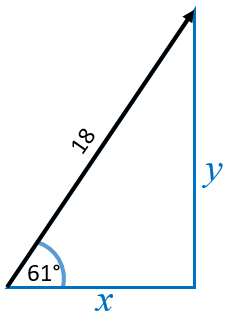
 |
Magnitude and DirectionCalculate the magnitude and direction of a vector and convert between forms. |
You can draw on a coordinate grid to help you answer some of the questions below.
This is Vectors - Magnitude and Direction level 1. You can also try:
Vector Connectors
Level 2
Level 3
InstructionsTry your best to answer the questions above. Type your answers into the boxes provided leaving no spaces. As you work through the exercise regularly click the "check" button. If you have any wrong answers, do your best to do corrections but if there is anything you don't understand, please ask your teacher for help. When you have got all of the questions correct you may want to print out this page and paste it into your exercise book. If you keep your work in an ePortfolio you could take a screen shot of your answers and paste that into your Maths file. |
||
|
|
||
|
|

|
More Activities: |
|
Mathematicians are not the people who find Maths easy; they are the people who enjoy how mystifying, puzzling and hard it is. Are you a mathematician? Comment recorded on the 9 May 'Starter of the Day' page by Liz, Kuwait: "I would like to thank you for the excellent resources which I used every day. My students would often turn up early to tackle the starter of the day as there were stamps for the first 5 finishers. We also had a lot of fun with the fun maths. All in all your resources provoked discussion and the students had a lot of fun." Comment recorded on the 19 October 'Starter of the Day' page by E Pollard, Huddersfield: "I used this with my bottom set in year 9. To engage them I used their name and favorite football team (or pop group) instead of the school name. For homework, I asked each student to find a definition for the key words they had been given (once they had fun trying to guess the answer) and they presented their findings to the rest of the class the following day. They felt really special because the key words came from their own personal information." |
Each month a newsletter is published containing details of the new additions to the Transum website and a new puzzle of the month. The newsletter is then duplicated as a podcast which is available on the major delivery networks. You can listen to the podcast while you are commuting, exercising or relaxing. Transum breaking news is available on Twitter @Transum and if that's not enough there is also a Transum Facebook page. |
|
AnswersThere are answers to this exercise but they are available in this space to teachers, tutors and parents who have logged in to their Transum subscription on this computer. A Transum subscription unlocks the answers to the online exercises, quizzes and puzzles. It also provides the teacher with access to quality external links on each of the Transum Topic pages and the facility to add to the collection themselves. Subscribers can manage class lists, lesson plans and assessment data in the Class Admin application and have access to reports of the Transum Trophies earned by class members. If you would like to enjoy ad-free access to the thousands of Transum resources, receive our monthly newsletter, unlock the printable worksheets and see our Maths Lesson Finishers then sign up for a subscription now: Subscribe |
||
Go MathsLearning and understanding Mathematics, at every level, requires learner engagement. Mathematics is not a spectator sport. Sometimes traditional teaching fails to actively involve students. One way to address the problem is through the use of interactive activities and this web site provides many of those. The Go Maths page is an alphabetical list of free activities designed for students in Secondary/High school. Maths MapAre you looking for something specific? An exercise to supplement the topic you are studying at school at the moment perhaps. Navigate using our Maths Map to find exercises, puzzles and Maths lesson starters grouped by topic. | ||
Teachers | ||
|
If you found this activity useful don't forget to record it in your scheme of work or learning management system. The short URL, ready to be copied and pasted, is as follows: |
Alternatively, if you use Google Classroom, all you have to do is click on the green icon below in order to add this activity to one of your classes. |
It may be worth remembering that if Transum.org should go offline for whatever reason, there is a mirror site at Transum.info that contains most of the resources that are available here on Transum.org. When planning to use technology in your lesson always have a plan B! |
|
Do you have any comments? It is always useful to receive feedback and helps make this free resource even more useful for those learning Mathematics anywhere in the world. Click here to enter your comments. |
||
© Transum Mathematics 1997-2025
Scan the QR code below to visit the online version of this activity.
https://www.Transum.org/go/?Num=597
Close
❎Vector Connectors - A basic set of exercises on vectors which could be done before attempting the following.
Vectors - Addition and subtraction of vectors and multiplication of a vector by a scalar.
Level 1 - Magnitude of a vector from a column vector
Level 2 - Direction of a vector from a column vector
Level 3 - Finding the column vector from magnitude-direction form
Exam Style Questions - A collection of problems in the style of GCSE or IB/A-level exam paper questions (worked solutions are available for Transum subscribers).
More on this topic including lesson Starters, visual aids, investigations and self-marking exercises.
Answers to this exercise are available lower down this page when you are logged in to your Transum account. If you don’t yet have a Transum subscription one can be very quickly set up if you are a teacher, tutor or parent.
See the National Curriculum page for links to related online activities and resources.
This set of exercises is to provide you with practice calculating the magnitude and direction of a vector and converting between component form and magnitude/direction form.
The magnitude of a vector is the length of the vector. A length cannot be negative. If the horizontal and vertical components are known it can be calculated using Pythagoras' theorem.
For example consider the vector:
$$ \mycolv{9\\12} $$
The magnitude is:
$$ \sqrt{9^2 + 12^2} = 15$$The direction of the vector can be calculated using trigonometry. The angle the vector makes with the horizontal is the inverse tan of the vertical component divide by the horizontal component.
$$ \tan^{-1} \frac{12}{9} = 53.1^o$$If the magnitude and direction are given, as in the diagram below, trigonometry can be used to calculate the components for the column vector.
 $$ x = 18 \cos 61^o = 8.73$$
$$ y = 18 \sin 61^o = 15.7$$
$$ x = 18 \cos 61^o = 8.73$$
$$ y = 18 \sin 61^o = 15.7$$
So the column vector, with components expressed to 3 significant figures, is:
$$ \mycolv{8.73\\15.7} $$Don't wait until you have finished the exercise before you click on the 'Check' button. Click it often as you work through the questions to see if you are answering them correctly. You can double-click the 'Check' button to make it float at the bottom of your screen.
Answers to this exercise are available lower down this page when you are logged in to your Transum account. If you don’t yet have a Transum subscription one can be very quickly set up if you are a teacher, tutor or parent.
Close
❎